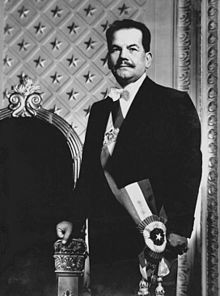Pedro Aguirre Cerda
| Pedro Aguirre Cerda | |
|---|---|
 |
|
| President of Chile | |
|
In office December 25, 1938 – November 25, 1941 |
|
| Vice President | Jerónimo Méndez |
| Preceded by | Arturo Alessandri |
| Succeeded by | Jerónimo Méndez |
| Personal details | |
| Born |
February 6, 1879 Pocuro, Chile |
| Died | November 25, 1941 (aged 62) Santiago, Chile |
| Political party | Radical Party |
| Spouse(s) | Juana Rosa Aguirre Luco |
Pedro Aguirre Cerda (February 6, 1879 – November 25, 1941) was a Chilean political figure. A member of the Radical Party, he was chosen as the Popular Front's candidate for the 1938 presidential election, and was triumphally elected. He governed Chile until his death in 1941. Pedro Aguirre Cerda was of Basque descent.
He was born in Pocuro, a small village near the city of Los Andes, in Chile. The seventh of a total of eleven children of Juan Bautista Aguirre and Clarisa Cerda. His father, a farmer, died when he was eight years old in 1887. His mother had to run the farm and raise him and all his brothers alone.
He finished his university studies in Santiago, at the Pedagogic Institute and became a teacher of Spanish in 1900. In 1904 he became a lawyer. He married his cousin Juana Rosa Aguirre Luco, with whom he had no children. In 1910, thanks to a government scholarship he studied administrative and financial law at La Sorbonne, plus political economy and social legislation at the College de France. He returned to Chile in 1914 and took a position as a teacher at the Instituto Nacional. He also became president of the National Society of Teachers.
He was a very distinguished teacher, attorney, deputy and senator. He was also the first dean of the new school of economy of the Universidad de Chile. As a member of the Radical Party, he was minister of Public Instruction and of the Interior during the administrations of Juan Luis Sanfuentes and Arturo Alessandri. During the period of military domination, he was persecuted and became an active opposition leader to the government of General Carlos Ibáñez del Campo.
For the presidential elections of 1938, he was the candidate of the Popular Front, and narrowly defeated conservative candidate Gustavo Ross, mostly because of the political backlash caused by the Seguro Obrero Massacre.
...
Wikipedia
